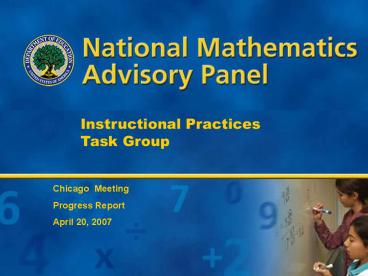Instructional Practices - PowerPoint PPT Presentation
1 / 24
Title:
Instructional Practices
Description:
Instructional Practices. Task Group. Framing of the Methodology Used and ... What is the impact of instructional approaches that feature the use of 'real ... – PowerPoint PPT presentation
Number of Views:135
Avg rating:3.0/5.0
Title: Instructional Practices
1
Instructional Practices Task Group
Chicago Meeting Progress Report April 20, 2007
2
Instructional Practices Task Group
- Task Group Members
- Russell Gersten
- Camilla Benbow
- Douglas Clements
- Bert Fristedt
- Tom Loveless
- Vern Williams
- Joan Ferrini-Mundy, Ex Officio
- Diane Jones, Ex Officio
3
Instructional Practices Task Group
Framing of the Methodology Used and the First
Three Research Topics
4
Instructional Practices Task Group
- Studies Sorted into Four Categories
- Tier 1 Experimental and Quasi-experimental
Studies that Meet What Works Clearinghouse
Standards (Evidence of Causal Claims) - Tier 2 Quantitative Studies that are
Correlational/ Descriptive - Tier 3 Qualitative Research (including case
studies, beat the odds schools) - Tier 4 Flawed Experimental or Quasi-experimental
studies
5
Instructional Practices Task Group
- In analyzing Tier 1 Studies
- Studies Must Meet What Works Clearinghouse
standards (with two caveats) - Subject matter experts (Wu, Fristedt Williams)
will review the mathematical quality of - The measures
- The content taught (when feasible)
- 2. Context will be described and discussed
6
Instructional Practices Task Group
- Role of Tier 2 and Tier 3 Studies
- Will Help Frame Research Questions and Issues
- Assist in Interpreting Findings from Experimental
Research
7
Instructional Practices Task Group
Student and Teacher Centered Instruction Part
I Research on Cooperative and Peer Assisted
Learning
8
Cooperative Learning
9
Cooperative Learning
10
Peer Assisted Learning
11
Other Cooperative Learning Strategies
12
Mixed Approaches
13
Instructional Practices Task Group
- A. Formative Assessment
- Focus on studies that examine the following
questions - Does use of formative assessments in mathematics
improve students growth in mathematics
proficiency? - Are there tools or enhancements that help
teachers use this type of data? If so, do they
improve students growth in mathematics
proficiency
14
Instructional Practices Task Group
- Data Sources
- Ten experimental and quasi-experimental studies
- Elementary grades
- Outcomes include both procedural and problem
solving/conceptual measures of reasonable
reliability and criterion-related validity - Content validity is under review at current time
15
Instructional Practices Task Group
- C. Type of Formative Assessments Studied
- Sample from state standards
- Measures are brief and include a random selection
of items from the years scope and sequence - This approach is more reliable and valid than a
sampling of only one weeks material - This is the only body of research that has been
studied experimentally - Other approaches may have equal effect they
simply have not been studied systematically
16
Instructional Practices Task Group
- D. Findings Question 1
- Yes, use of formative assessments by teachers
(and often students) significantly enhances
students growth in math proficiency. - Result is statistically significant
- Average effect size is small and corresponds to
about a nine percentile point growth, on average
17
Instructional Practices Task Group
- E Findings Question 2
- Effect is almost doubled when the various
enhancements are added. - But, most of these studies include only special
education students. - Thus, it is unclear if the results will work as
well for non-disabled students. - Remember that almost 10 of the student
population currently fits into the learning
disabilities category.
18
Instructional Practices Task Group
F. What are the Enhancements? 1. Using formative
assessment data as basis for peer tutoring
activities. 2. Providing teachers with an
analysis of areas of strength and weakness for
individual students and areas of weakness for the
class. 3. Providing teachers with specific
instructional ideas and approaches to address the
identified problem. 4. Teaching students to
monitor their own progress and interpret the
graphs of their progress.
19
/..
Instructional Practices Task Group
Real-World Problem Solving
20
Instructional Practices Task Group
Fundamental Question
What is the impact of instructional approaches
that feature the use of real-world problems on
student learning and achievement?
21
Instructional Practices Task Group
- Real-world problems have been a feature (in
various forms and with differing levels of
emphasis) in US mathematics curriculum for a
century - Many current policy documents call for the use of
real-world problems in mathematics instruction,
and this is reflected in some instructional
materials
22
Instructional Practices Task Group
- Varied Meanings of Real-World Problems in the
Literature, e.g. - problems that will be meaningful, appealing, and
motivating for students (from contexts that they
know, from imaginary situations, from
mathematics) - authentic problems, similar to those in
applications beyond school - complex problems with multiple steps, integration
of concepts - open-ended problems
23
Instructional Practices Task Group
There are many arguments, based in beliefs,
experience, and research, both for and against
the use of real world problems in mathematics
instruction.
24
Instructional Practices Task Group
- Examining 12 studies thus far
- 3 quasi-experimental studies that have examined
the impact of specific curricula, all with
methodological problems - 9 other studies that look at the impact of
various types of instruction using real-world
problems, and/or instructional strategies to help
students solve real-world, again with
methodological problems































